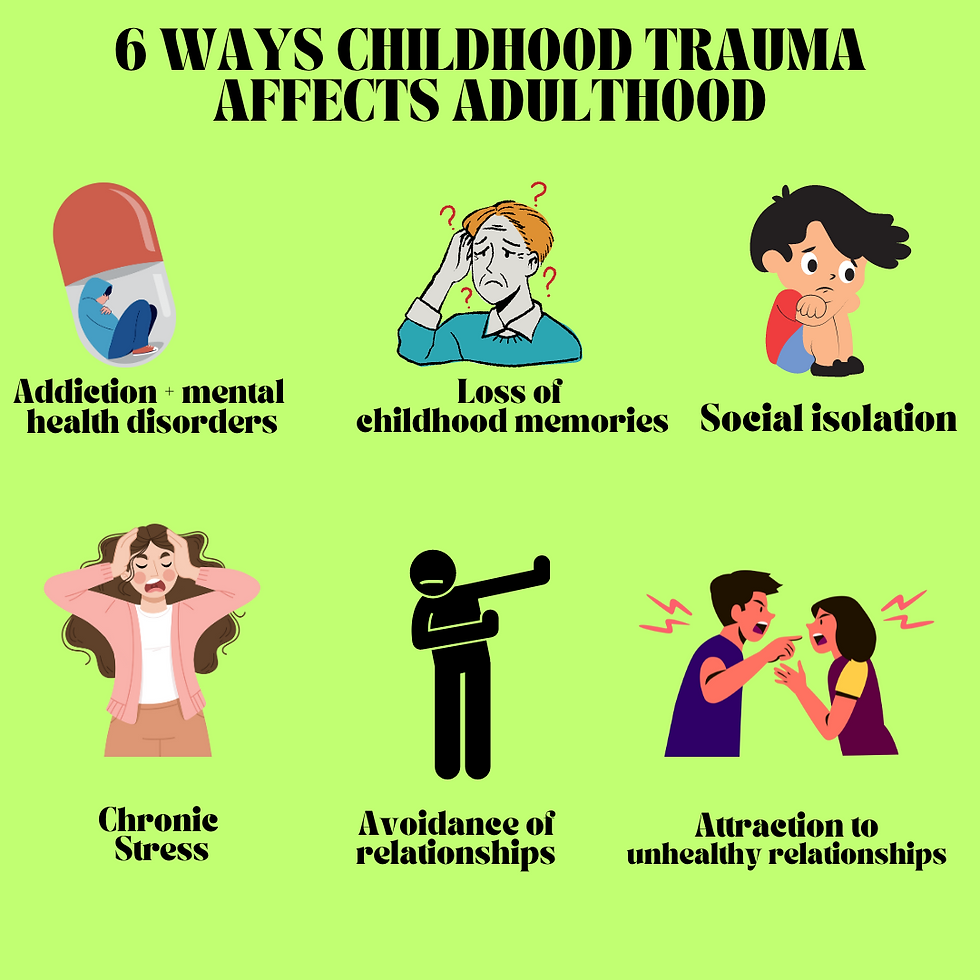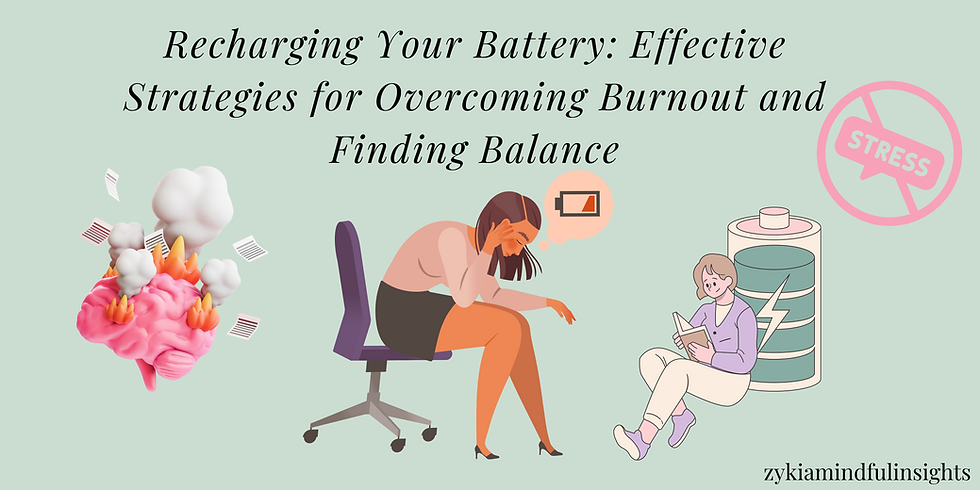Exploring the Impact of Childhood Trauma on Adult Mental Health
- Zykia Hannah

- Feb 9, 2024
- 8 min read

Childhood trauma can have a profound impact on adult mental health. Experiences such as abuse, neglect, or witnessing violence can increase the risk of developing mental health disorders like depression, anxiety, and post-traumatic stress disorder (PTSD). These early adverse experiences can also affect brain development, coping mechanisms, and interpersonal relationships, leading to long-term psychological challenges. Seeking therapy and support can be crucial in addressing and mitigating the effects of childhood trauma on adult mental health.
How Can Childhood Trauma Affect Adult Mental Health?
Childhood trauma can affect adult mental health in various ways :
Increased risk of mental health disorders : Childhood trauma, such as abuse, neglect, or witnessing violence, can elevate the risk of developing mental health conditions like depression, anxiety disorders, PTSD, and substance abuse disorders in adulthood.
Altered brain development : Traumatic experiences during childhood can disrupt normal brain development, particularly in regions associated with emotion regulation, memory processing, and stress response. This alteration may contribute to difficulties in regulating emotions and coping with stress later in life.
Impaired attachment and interpersonal relationships : Trauma can impact the formation of secure attachments and healthy interpersonal relationships. Adults who experienced childhood trauma may struggle with trust, intimacy, and forming healthy connections with others.
Maladaptive coping strategies : Individuals who have experienced childhood trauma may develop maladaptive coping mechanisms, such as avoidance, substance use, or self-harm, to deal with distressing emotions or memories. These coping strategies can exacerbate mental health symptoms and impair functioning.
Physical health implications : Childhood trauma has been linked to an increased risk of physical health problems in adulthood, including chronic conditions such as cardiovascular disease, obesity, and autoimmune disorders. The ongoing stress response triggered by childhood trauma can contribute to these health issues.
Increased vulnerability to re-traumatization : Adults who have experienced childhood trauma may be more vulnerable to experiencing additional traumas or re-traumatization due to factors such as hyper vigilance, difficulties in setting boundaries, and a heightened stress response.
Overall, childhood trauma can have a lasting impact on various aspects of adult mental health, highlighting the importance of early intervention and trauma-informed care approaches to promote healing and resilience.
"Understanding the profound impact of childhood trauma on adult mental health is the first step towards healing the wounds of the past and fostering resilience for the future."
Childhood trauma casts a long shadow over adult mental health, leaving lasting imprints that often manifest in complex ways. Whether stemming from abuse, neglect, or other adverse experiences, the effects of childhood trauma can reverberate throughout a person's life, shaping their emotional well-being, cognitive processes, and interpersonal relationships. Understanding the multifaceted impact of childhood trauma on adult mental health is crucial for developing effective interventions and support systems for those who have experienced such adversity.
Emotional and Psychological Consequences :
One significant way childhood trauma affects adult mental health is through its impact on emotional regulation and psychological well-being. Individuals who have experienced trauma during childhood may struggle with intense emotions, such as fear, anger, or shame, that stem from their past experiences. These unresolved emotions can contribute to the development of mental health disorders like depression, anxiety, and post-traumatic stress disorder (PTSD), as well as difficulties in managing stress and maintaining healthy relationships.
Interpersonal Challenges and Attachment Issues :
Childhood trauma can also disrupt the formation of secure attachments and healthy interpersonal relationships in adulthood. For many survivors, trust may be elusive, intimacy may feel overwhelming, and boundaries may be difficult to establish. These challenges can stem from early experiences of betrayal, abandonment, or exploitation, which shape their perceptions of themselves and others. As a result, individuals who have experienced childhood trauma may struggle with maintaining meaningful connections and may cycle through patterns of avoidance or unhealthy dependency in their relationships.
Cognitive and Behavioral Patterns :
The cognitive and behavioral consequences of childhood trauma can manifest it various ways, impacting in individual's thought processes, decision-making abilities, and coping mechanisms. Trauma can alter the way the brain processes information, leading to difficulties in concentration, memory impairment, and hyper vigilance. Additionally, survivors may develop maladaptive coping strategies, such as substance abuse, self-harm, or disordered eating, as a means of managing overwhelming emotions or numbing painful memories. These patterns can perpetuate cycles of dysfunction and exacerbate mental health symptoms in adulthood.
Promoting Healing and Resilience :
Despite the profound challenges posed by childhood trauma, there is hope for healing and resilience. Through trauma-informed therapy, support groups, and holistic approaches to self-care, individuals can begin to untangle the knots of their past and cultivate a sense of empowerment and agency in their lives. By acknowledging the impact of childhood trauma on adult mental health and offering compassionate, culturally sensitive interventions, we can pave the way for survivors to reclaim their narratives, rebuild their sense of self-worth, and forge connections that nurture their well-being.

Why does self isolation affects childhood trauma on adults mental health?
Self-isolation can exacerbate the effects of childhood trauma on adult mental health fro several reasons:
Lack of social support : Self-isolation often means cutting off or reducing contact with others, including friends, family, and support networks. For individuals who have experienced childhood trauma, social support can be crucial for coping with distressing emotions and memories. Without access to these supportive relationships, feelings of loneliness, abandonment, and disconnection may intensify, worsening mental health symptoms.
Increased rumination and intrusive thoughts : When left alone with their thoughts, individuals who have experienced childhood trauma may be more prone to rumination and intrusive memories. Self-isolation can create an environment where negative thoughts and memories dominate, leading to heightened anxiety, depression, and feelings of helplessness. Without external distractions or positive influences, the impact of trauma on mental health may feel overwhelming.
Loss of routine and structure : Self-isolation can disrupt daily routines and structures that provide stability and predictability, which are essential for managing symptoms of trauma-related disorders. Without regular activities, work, or social engagements to anchor them, individuals may struggle to regulate their emotions and maintain a sense of purpose, leading to increased stress and disorientation.
Limited access to coping strategies : Self-isolation may limit access to healthy coping strategies and resources that individuals rely on to manage their mental health. This can include therapy sessions, exercise facilities, support groups, or other outlets for self-care. Without these resources, individuals may resort to maladaptive coping mechanisms, such as substance use or self-harm, to cope with heightened distress.
Exacerbation of existing mental health conditions : For individuals already grappling with mental health disorders stemming from childhood trauma, self-isolation can exacerbate symptoms and trigger relapses. The lack of external support, structure, and positive distractions can intensify feelings of hopelessness, worthlessness, and despair, making it even more challenging to navigate daily life.
Overall, self-isolation can amplify the negative impact of childhood trauma on adult mental health by depriving individuals of essential social connections, coping resources, and routines that help them manage their symptoms and maintain well-being. it underscores the importance of finding alternative ways to stay connected, seek support, and prioritize self-care, even in challenging circumstances.
How can you heal from childhood trauma as an adult?
Healing from childhood trauma as an adult is a complex and individualized process, but here are some strategies that may be helpful:
Therapy : Seeking therapy with a qualified mental health professional, such as a psychologist or counselor, can be instrumental in healing from childhood trauma. Therapeutic modalities such as cognitive-behavioral therapy (CBT), dialectical behavior therapy (DBT), eye movement desensitization and reprocessing (EMDR), and trauma-focused therapy can help individuals process traumatic experiences, develop coping skills, and work through unresolved emotions.
Support groups : Joining support groups or peer-led organizations for trauma survivors can provide a sense of community, validation, and understanding. Connecting with others who have experienced similar challenges can offer perspective, encouragement, and practical advice on coping with triggers and navigating recovery.
Self-care practices : Engaging in self-care practices, such as mindfulness, meditation, yoga, exercise, and creative expression, can help individuals regulate their emotions, reduce stress, and foster a sense of empowerment. Taking time for activities that bring joy and fulfillment can counteract the negative effects of trauma and promote overall well-being.
Healthy relationships : Cultivating healthy, supportive relationships with trustworthy individuals can provide a source of stability, validation, and emotional safety. Building strong connections with friends, family members, or romantic partners who prioritize empathy, communication, and respect can help individuals feel valued and understood as they work through their healing journey.
Setting boundaries : Learning to set and maintain boundaries is essential for protecting oneself from further harm and creating a sense of safety and autonomy. Setting boundaries with toxic or triggering individuals, prioritizing one's own needs and preferences, and practicing assertive communication can help individuals establish a sense of control and agency in their lives.
Education and advocacy : Educating oneself about the effects of childhood trauma and advocating for trauma-informed care and support systems can be empowering and validating. By learning about trauma's impact on the brain, behavior, and relationships, individuals can better understand their own experiences and advocate for compassionate, culturally sensitive approaches to healing and recovery.
Patience and self-compassion : Healing from childhood trauma is a gradual and nonlinear process that requires patience, self-compassion, and resilience. It's essential to acknowledge the process made, celebrate small victories, and practice self-acceptance and forgiveness along the way. Embracing the journey of healing with kindness and understanding can pave the way for profound transformation and growth.
"Childhood trauma leaves a fingerprint on the soul, shaping the contours of adult mental health, but within the scars lies the potential for resilience and renewal."
In closing, it's clear that exploring the impact of childhood trauma on adult mental health reveals the depth of its influence on every aspect of one's well-being. From emotional and psychological consequences to interpersonal challenges and cognitive patterns, childhood trauma casts a long shadow over adulthood. However, through therapy, support groups, self-care practices, healthy relationships, boundary-setting, education, and self-compassion, individuals can embark on a journey of healing and resilience. By acknowledging the past, embracing the present, and fostering hope for the future, survivors of childhood trauma can rewrite their narratives, reclaim their sense of agency, and cultivate a life filled with meaning, connection, and possibility.
In this next part, I will be talking about the common types of childhood trauma :
Physical abuse
Emotional abuse
Sexual Abuse
Neglect
Witnessing domestic violence
Bullying
Parental substance abuse
Parental mental illness
Separation or divorce
Loss of caregiver
Natural disasters
Accidents or injuries
Community violence
War or political violence
Foster care system experiences
How childhood trauma impact adult relationships in various ways:
Trust issues : Individuals who have experienced childhood trauma may struggle to trust others, leading to difficulties in forming secure attachments and maintaining intimacy in relationships.
Fear of abandonment : Trauma survivors may have a heightened fear of abandonment, stemming from early experiences of neglect or loss, which can manifest as clinginess, jealousy, or difficulty with separations in adult relationships.
Poor communication skills : Childhood trauma can affect a person's ability to communicate effectively in relationships, leading to difficulties in expressing emotions, setting boundaries, or resolving conflicts constructively.
Attachment styles : Trauma can influence adult attachment styles, such as anxious, avoidant, or disorganized attachment, which can impact how individuals approach and navigate relationships.
Self-esteem : Childhood trauma can erode self-esteem and self-worth, leading individuals to seek validation and approval from others in relationships or to struggle with feelings of inadequacy and unworthiness.
Reenactment of past trauma : Some individuals may unconsciously repeat patterns of past trauma in their adult relationships, such as seeking out abusive partners or recreating dysfunctional family dynamics, as a way of trying to resolve or make snese of their experiences.
Difficulty with intimacy : Trauma survivors may have difficulty with intimacy and vulnerability in relationships, either avoiding closeness altogether or becoming overly dependent on their partners for emotional support.
Emotional regulation : Childhood trauma can disrupt emotional regulation skills, leading to mood swings, impulsivity, or emotional detachment that can strain relationships and lead to misunderstandings or conflict.
Parenting challenges : Adults who have experienced childhood trauma may struggle with parenting their own children, either replicating patterns of abuse or neglect they experienced or being overly protective or controlling out of fear of repeating the past. Overall, childhood trauma can profoundly impact the way individuals approach and experience adult relationships, often requiring therapy and support to navigate these challenges and cultivate healthy, fulfilling connections.
Thank you for reading today's blog. I just want you to know that you mean something in this world, and that I love you. You have a bright future and don't let anyone or nothing stop you from doing something great in life 🩷.
🫧Quote of the day :
"As you process through one layer of trauma to release the pain and heal, a new layer will surface."




Comments